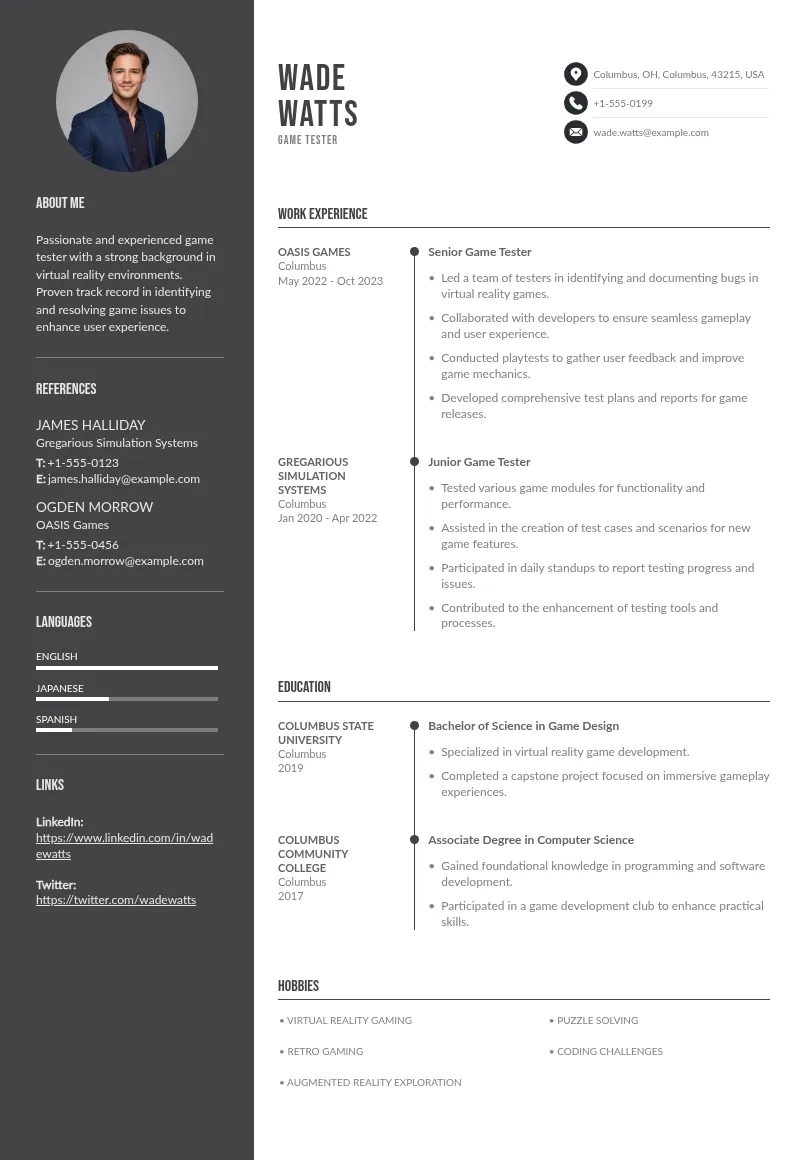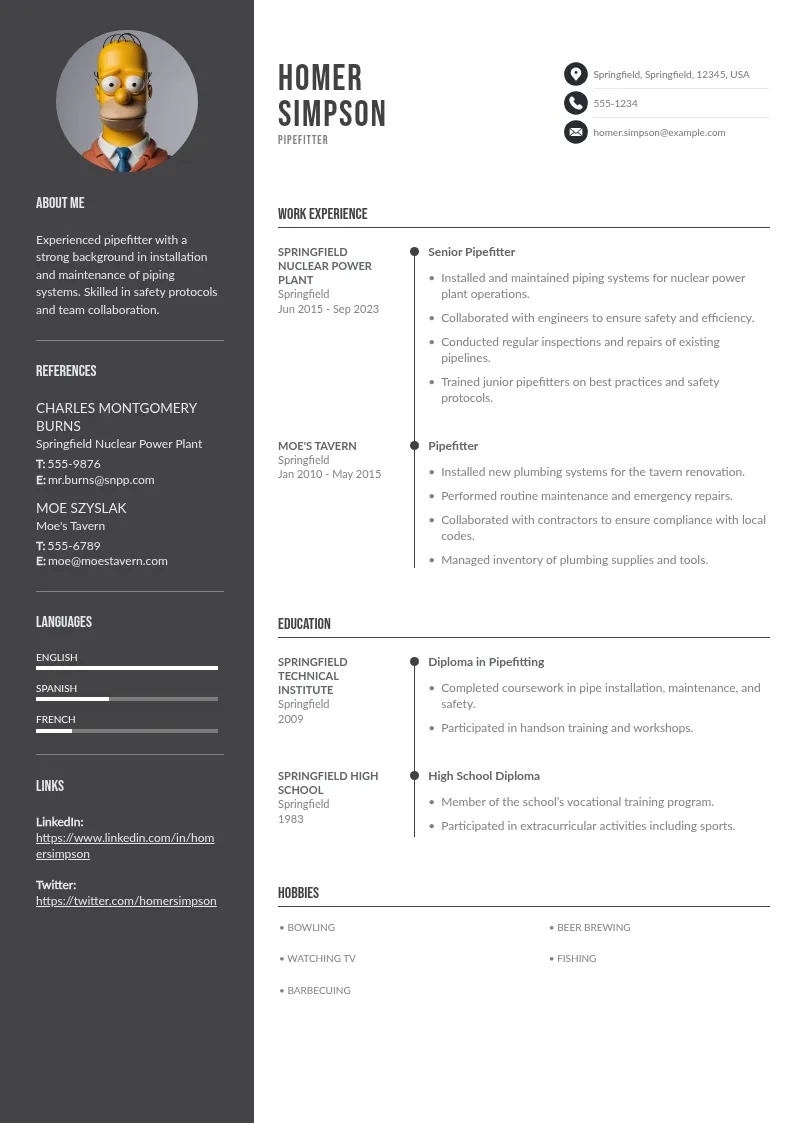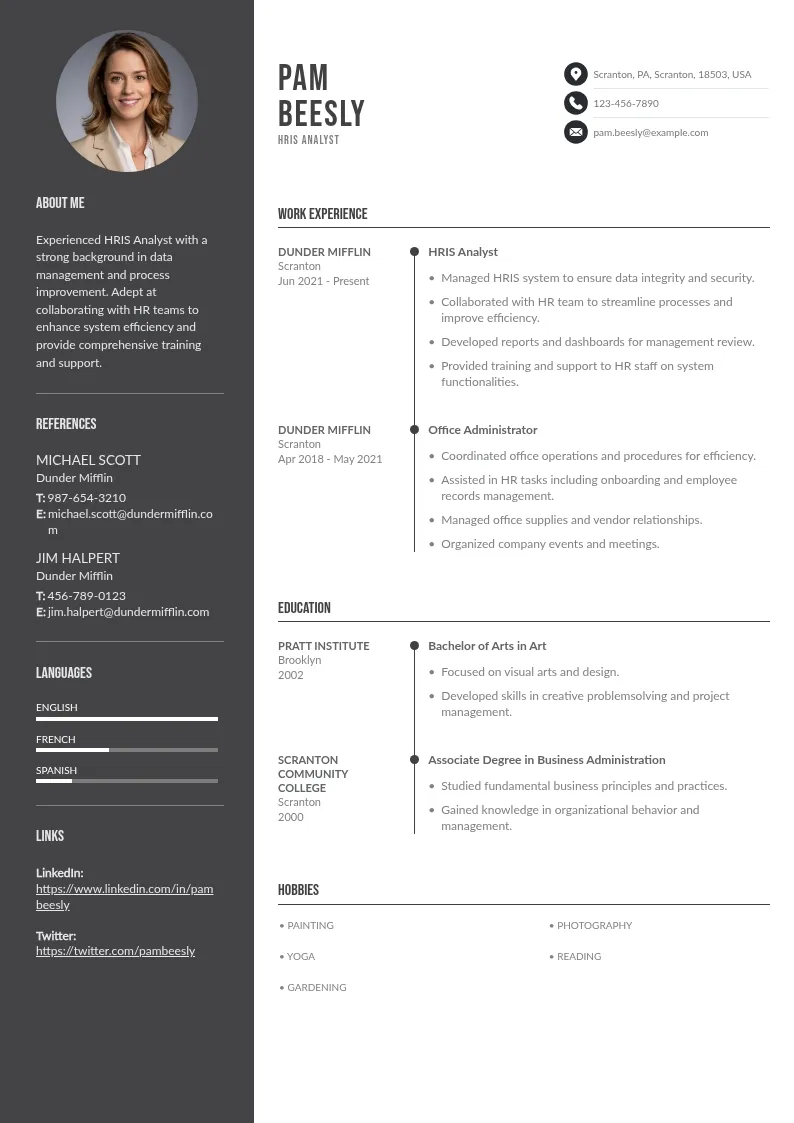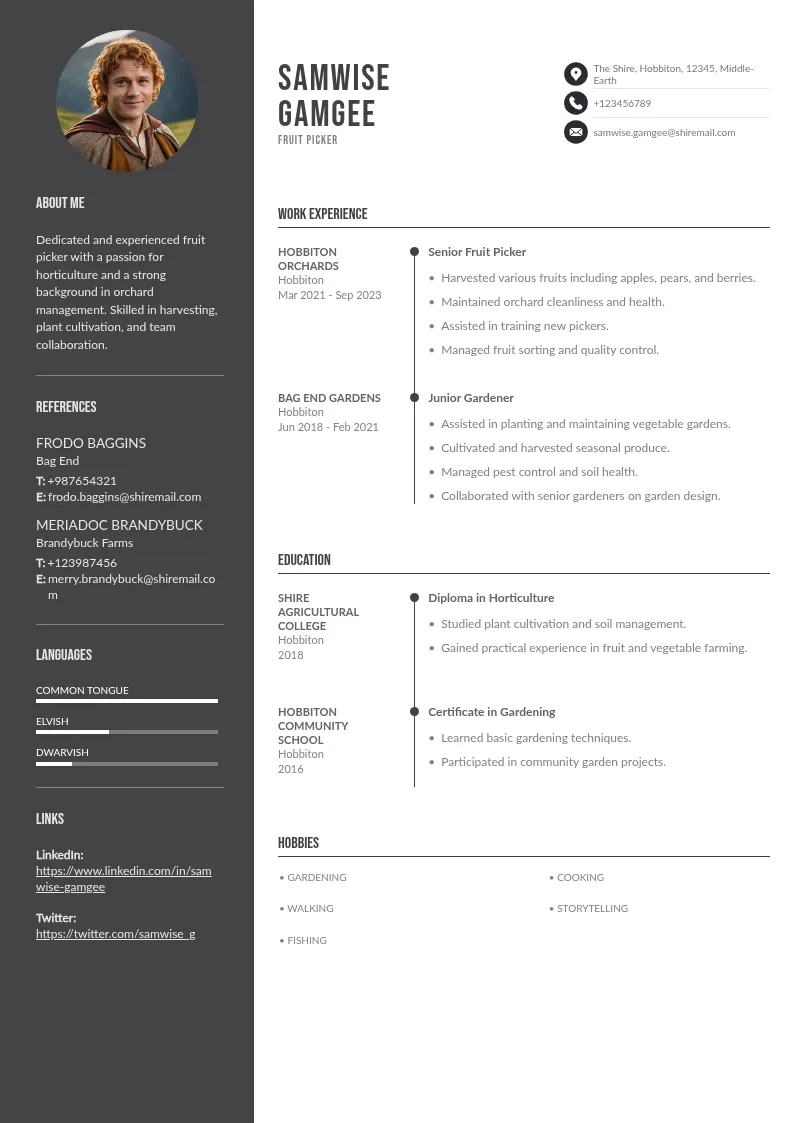IT Specialist Resume Examples
Let's start with proven examples of IT specialist resumes for different career stages and jobs.
If you want a fast and easy way to create a standout and ATS-friendly IT specialist resume, you can use our resume builder and significantly boost your chances of getting an interview.
IT Specialist Resume
This resume is for individuals pursuing roles as IT Specialists responsible for maintaining and optimizing computer systems, networks, and software applications. Positions typically involve troubleshooting technical issues, ensuring system security, and enhancing IT infrastructure.
Job Description
IT Specialists support and maintain hardware and software systems, troubleshoot network and system issues, and ensure data security. They collaborate with other IT staff to implement solutions and enhance system performance.
Key Notes
Emphasize technical skills, problem-solving abilities, and relevant experience. Highlight knowledge of operating systems, network configurations, and security protocols.

Additional Tips
- Certifications: Include relevant IT certifications to showcase specialized knowledge and expertise.
- Problem-Solving Focus: Highlight examples where technical solutions improved system performance or security.
- Quantify Achievements: Mention metrics that demonstrate efficiency improvements or cost savings.
- Professional Formatting: Organize the resume with clear headings and bullet points for easy readability.
IT Support Specialist Resume
This resume is for individuals seeking positions as IT Support Specialists. These specialists are responsible for troubleshooting technical issues, maintaining IT systems, and providing end-user support. Their roles typically involve diagnosing hardware and software problems, supporting network connectivity, and ensuring smooth IT operations.
Job Description
IT Support Specialists offer technical assistance to users, resolve IT issues, and maintain system functionality. They collaborate with teams to enhance IT infrastructure and provide training on software and hardware usage.
Key Notes
Emphasize technical support skills, problem-solving abilities, and communication skills. Highlight experience with troubleshooting, help desk operations, and customer service.

Additional Tips
- Certifications: Emphasize relevant IT support certifications to showcase technical expertise.
- Problem-Solving Focus: Highlight instances of successfully resolving complex technical issues.
- Customer Service Skills: Demonstrated effective communication and user interaction abilities.
- Quantify Achievements: Include metrics showing improvements in support efficiency or user satisfaction.
Entry-Level IT Specialist Resume
This resume is for individuals seeking entry-level positions as IT Specialists, focusing on system maintenance, troubleshooting, and technical support. Roles typically involve assisting in IT operations, supporting end-users, and learning advanced IT skills.
Job Description
Entry-level IT Specialists provide basic technical support, assist in maintaining IT systems, and help resolve hardware and software issues. They collaborate with senior IT staff to learn and implement best practices.
Key Notes
Emphasize foundational IT skills, eagerness to learn, and problem-solving abilities. Highlight any relevant coursework, internships, or technical projects.

Additional Tips
- Certifications: Mention foundational certifications to demonstrate technical knowledge.
- Eagerness to Learn: Highlight a proactive approach to learning and growth.
- Technical Projects: Include any academic or personal projects relevant to IT.
- Professional Formatting: Use clear headings and bullet points for easy readability.
Senior IT Specialist Resume
This resume is for experienced IT professionals pursuing senior-level positions who are responsible for overseeing IT infrastructure, managing teams, and driving technology solutions. Roles typically involve strategic planning, advanced troubleshooting, and implementing complex IT systems.
Job Description
Senior IT Specialists lead IT projects, provide high-level technical support, and ensure system security and efficiency. They collaborate with stakeholders to align IT strategies with business objectives.
Key Notes
Emphasize leadership skills, advanced technical expertise, and strategic problem-solving abilities. Highlight experience in project management, system integration, and team collaboration.

Additional Tips
- Certifications: Include high-level certifications to demonstrate advanced expertise.
- Leadership Experience: Emphasize team management and strategic planning roles.
- Strategic Impact: Highlight contributions to business growth and operational efficiency.
- Quantify Achievements: Use metrics to showcase cost savings, productivity gains, or security improvements.
Network Administrator Resume
This resume is for individuals seeking roles as Network Administrators, responsible for designing, implementing, and maintaining network infrastructure. Positions typically involve configuring network hardware, ensuring network security, and optimizing system performance.
Job Description
Network Administrators manage and maintain network systems, troubleshoot connectivity issues, and ensure data integrity and security. They collaborate with IT teams to enhance network performance and support business operations.
Key Notes
Emphasize technical networking skills, problem-solving abilities, and security expertise. Highlight experience with network configurations, monitoring tools, and infrastructure management.

Additional Tips
- Certifications: Include networking certifications to validate technical expertise.
- Technical Skills: Highlight routing, switching, and network security proficiency.
- Quantify Achievements: Use metrics to showcase network performance improvements or security enhancements.
- Professional Formatting: Use clear headings and bullet points for easy readability.
IT Consultant Resume
This resume is for individuals pursuing roles as IT Consultants, responsible for advising organizations on technology solutions, optimizing IT systems, and driving digital transformation. Positions typically involve strategic planning, systems integration, and enhancing operational efficiency.
Job Description
IT Consultants analyze business needs, design customized IT solutions, and oversee implementation. They collaborate with stakeholders to align technology strategies with organizational goals and provide expert guidance on system upgrades and security.
Key Notes
Emphasize strategic problem-solving, client management, and technical expertise. Highlight experience in consulting, project management, and cross-functional collaboration.

Additional Tips
- Certifications: Highlight consulting-specific certifications to demonstrate strategic expertise.
- Client Management: Emphasize experience in stakeholder communication and client satisfaction.
- Strategic Impact: Showcase contributions to digital transformation and business growth.
- Quantify Achievements: Use metrics to highlight productivity improvements or cost savings.
How to Write an IT Specialist Resume
Whether you’re a fresh graduate, a beginner, or a pro, preparing an impressive resume for an IT specialist is necessary. While plenty of positions are waiting to be filled by deserving candidates, there’s also a growing number of knowledgeable individuals waiting for their opportunity.
Your resume should generally include:
- Header - your name, contact information
- Summary
- Work experience
- Educational background
- Skills
- Relevant certifications
- Additional sections
Here are some tips that will help you create a professional IT specialist resume:
- Find a good resume example that suits your style. Follow a resume format that highlights your best skills relevant to the job opening. Prioritize reverse-chronological or hybrid formats for clear organization.
- Triple-check to make sure that your contact information is precise and updated. This is the only way the hiring manager can reach you. Include your LinkedIn profile or a personal portfolio/GitHub if applicable.
- Display your technical skills, your broad range of computer skills, overall network capabilities, and other relevant skills for the job post. Use a “Skills” section with categories such as “Networking,” “Security,” “Programming,” and “Tools & Platforms.”
- Include all your IT certifications. Make sure they are current and updated, and include the validity dates of your certifications when necessary. Highlight industry-recognized credentials like CompTIA, Cisco, Microsoft, or AWS.
- Attach a cover letter to your professional resume. Tailor it for each position, showing your understanding of the company’s IT needs and how you can help meet them.
- If a professional summary might seem lacking, use a resume objective instead. Especially useful for entry-level applicants or career changers who want to show enthusiasm and goals aligned with the role.
- Highlight your knowledge of operating systems, programming languages, software systems, computer hardware, and even your ability to find solutions to network-related issues, system failures, and more. Support each skill with real-world examples or results.
- Plenty of new technologies are coming out almost daily. Look for online courses or institutions providing training. Get certified, learn the top skills, and learn new programming languages, software, and operating systems. All these can be added to your IT specialist resume.
- Use numbers and metrics to demonstrate your impact. For example, “Reduced network downtime by 35%,” or “Automated manual processes, saving 10 hours/week.”
- Showcase project work or freelance experience. Personal or academic projects can be included if they demonstrate relevant technical skills and problem-solving.
- Incorporate keywords from the job description. Many companies use applicant tracking systems (ATS), including relevant terms like “cybersecurity,” “cloud infrastructure,” or “DevOps,” which improves your chances of passing the scan.
- Don’t forget soft skills. Strong communication, problem-solving, teamwork, and time management are all valuable in IT environments, especially for client or cross-departmental collaboration roles.
- Proofread your resume carefully. Typos and formatting errors can be a red flag, especially in tech roles where attention to detail is critical.
Let’s visit all essential sections of the IT specialist resume.
Header
The header appears at the top of your resume and should provide essential contact details and a brief description of your professional identity. It sets the tone and makes it easy for employers to reach you.
Header Example:
Summary
As with most resumes, including a summary or objective is advisable. A short paragraph summarizing the entire resume typically appears on top when looking at resume examples.
A resume summary or objective is another excellent way to make your resume stand out. The professional summary must be short, straight to the point, and detailed.
When writing a professional summary, remember to customize your resume summary to ensure that it shows that you’re the perfect person for the job. For example, show that you are a specialist in technical support and IT.
Summary Examples
For a fresh IT graduate:
For IT specialist with work experience:
Work History
Most companies look for IT specialists with experience. If you don’t have any formal work experience yet, begin building your portfolio and improving your skills now.
Make your work history stand out on your resume. Display your experiences, the companies you’ve worked with, and the positive results you have produced at work.
Give more importance to those experiences you have that are relevant to the job description.
Also, you must be sure that your knowledge is updated. Since innovations in technology happen daily, what you learned five years ago might no longer be useful today.
When writing your work experience, include the company’s name and location and the dates you’ve worked with them. Add your main tasks, key performance indicators, and achievements.
Example:
Skills for IT Specialist
Your hard skills are highly important in an IT specialist job, so you must include them in your resume.
Depending on the position you are applying for, these are some of the hard skills and qualities employers are usually looking for:
- Knowledge in Internet security
- Understanding of how networking works
- Communication skills
- Project management
- Knowledge of programming language
- Knowledge of multiple operating systems
- Willingness to provide technical support 24/7
- Ability to perform system updates
- Ability to address connectivity problems
- Updated with all new technologies
Your soft skills matter, too. If you have already impressed the hiring manager with all the knowledge and measurable skills you can offer, you must tell them why they should make you part of their team. These are some skills that are great to have on your resume:
- Analytical abilities and problem-solving skills
- Resourcefulness
- Perseverance
- Team player
- Sense of urgency
- Creativity
- Sense of accountability and ownership
Your sense of accountability matters considerably. As mentioned earlier, even the most minor mistakes on a system software or IT issues that aren’t resolved immediately can result in massive problems for the company and its end users. If you are honest and know how to take responsibility, your future employer will appreciate you.
Make a List of the Programming Languages
You must already know that being an IT specialist is not easy. Programming languages are among the most difficult areas to master in IT.
Since so many programming languages exist today, it would be great if you master everything, but it’s okay if you don’t. Just list the ones you are familiar with and have a working knowledge of, and include your proficiency level.
Here’s an example of how you can display your programming languages section on your IT specialist resume.
- Python - Advanced
- Java Script - Intermediate
- C++ - Advanced
- C - Advanced
- PHP - Basic
Display Your IT Certifications
There are plenty of certifications you can get as an IT professional. Here are some of the best IT certifications you can get, which should be displayed on your resume.
- Google Certified Professional Cloud Architect
- CISM – Certified Information Security Manager
- CRISC – Certified in Risk and Information Systems Control
- CISSP – Certified Information Systems Security Professional
- AWS Certified Solutions Architect – Associate
- ITIL Foundation Certification
- Oracle Certified MySQL Database Administrator (CMDBA)
- Cisco Certified Internetwork Expert (CCIE)
- Cisco Certified Network Associate (CCNA)
- Cisco Certified Professional Network Professional (CCNP)
Education
Because of the huge demand for IT professionals, there are plenty of Computer Science and Information Technology courses offered in colleges and universities worldwide.
An IT specialist resume example may include details of your Associate’s, Bachelor’s, Master’s, or even Doctorate if you have one. While having a degree is a great advantage, it is not necessarily required for all IT specialist jobs. We’ve often seen IT professionals, even owners of large IT companies, who were not degree holders when they started.
Most IT certifications don’t have college degrees as prerequisites.
Relevant certifications and work experience can substitute for a degree. However, having a college diploma is something to be proud of. This can give you an edge over other applicants.
If you have a degree, make it stand out on your resume. Here’s how you can write it:
Key Takeaways
A professional, detailed, and impressive-looking IT specialist resume can help you get your dream job. Your resume and cover letter must include a resume summary and all the personal data you want your potential employer to learn about you.
If you are running out of ideas on making your resume look impressive, look for an IT specialist resume example to guide you. Templates and resume builders can also help you find the best format to use so your resume looks clean, detailed, and aesthetically pleasing.
Make sure your contact details are correct and updated. Highlight your work experience, certifications, and educational background. Use keywords and keyphrases so a hiring manager can easily find your resume among many aspiring applicants.
An information technology specialist responsible for addressing technical problems, which can be complex at times, must have the necessary problem-analysis and problem-solving skills. Both your soft and hard skills matter—your ability to assist users and team members and your capability to find the best solutions to trouble tickets and other complex issues are things companies seek in an IT pro.






















 INCORRECT
INCORRECT











